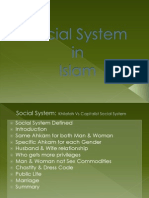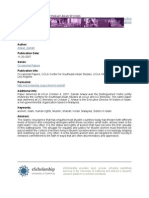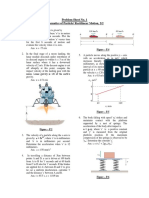Women Education Right in Islam
Women Education Right in Islam
Uploaded by
Hejrat NiaziCopyright:
Available Formats
Women Education Right in Islam
Women Education Right in Islam
Uploaded by
Hejrat NiaziOriginal Description:
Original Title
Copyright
Available Formats
Share this document
Did you find this document useful?
Is this content inappropriate?
Copyright:
Available Formats
Women Education Right in Islam
Women Education Right in Islam
Uploaded by
Hejrat NiaziCopyright:
Available Formats
1.
women education right in Islam:
To understand the history of the status of women in Muslim majority communities, one must
start with the pre Islamic period, the pre Islamic period is referred to as al jahiliyah, which means
the period of ignorance.in the pre Islamic Arabia women were treated as subordinate to men,
basically women enjoyed no rights, they could be inherited as possessions or enslaved and
according to holy Quran Arabs during Jahiliyah would bury their daughters alive. The prophet
Mohammad PBUH and Holy Quran revelations had a powerful role in changing the social
position of women, the prophet Mohammad PBUH was instructed that his message was
addressed to both men and women alike, so he sought to achieve equality.
According to Quran men and women are seen as equal in the eyes of Allah Verse 4:1 of the
Quran Says,
“O mankind! reverence your Guardian-Lord, Who created you from a single person created of
like nature his mate and from them twain scattered (like seeds) countless men and women;
reverence Allah through Whom ye demand your mutual (rights) and (reverence) the wombs (that
bore you): for Allah ever watches over you
The Qur’an indicates that men and women are spiritual equals as well. Verse 4:124 of the Qur’an
says, “If any do deeds of righteousness be, they male or female and have faith, they will
enter Heaven, and not the least injustice will be done to them.” This verse shows does not
segregate men and women from entering Heaven. Verse 3:195 of the Qur’an says, “...Never will
I suffer to be lost the work of any of you, be he male or female: Ye are from, one
another...Lastly, verse 33:35,
“For Muslim men and women for believing men and women for devout men and women for true
men and women for men and women who are patient and constant for men and women who
humble themselves for men and women who give in charity for men and women who fast (and
deny themselves) for men and women who guard their chastity and for men and women who
engage much in Allah's praise for them has Allah prepared forgiveness and great reward.”25
These verses, with others demonstrate that men and women are, in the words of the Holy Qur’an,
equal.
2. Women Working Right in Islam:
Women are allowed to work in Islam, subject to certain conditions. For example, an acceptable
circumstance is if a woman is in financial need and her employment does not cause her to
neglect her important role as a mother and wife.
According to the noble Shari'a [Islamic law], it is permissible for a Muslim woman to go out for
work providing the following conditions:
- The job is deemed permissible in Shari'a and does not include anything that contradicts legal rulings.
- The woman guarantees safety for her person, chastity and religion [from temptation).
- The job suits woman's physical and psychological nature.
Evidence from the sunna:
Consequently, a woman's work should not contradict righteousness [birr] or oppose her guardian's
responsibility over her.
Jabir Ibn 'Abdullah (Allah be pleased with them) reported: My maternal aunt was divorced, and she
intended to pluck her dates [from palm trees]. A person scolded her for having come out (during her
waiting period). She came to the Prophet (peace and blessings be upon him) and he told her: "Certainly
you can pluck (dates) from your palm trees, for perhaps you may give out charity or do an act of
kindness." [Muslim, Sahih).
3. Women rights of Marriage in Islam:
According to Islam, both men and women have rights over each other when they enter into
a marriage contract, with the husband serving as protector and supporter of the family most of the time,
from his means
Marriage in Islam is viewed as an important and sacred union between a man and woman that fulfills half
of one’s religious obligations.
A well-known passage in the Quran discusses marriage as follows: “Among His signs is that He created
for you spouses from yourselves so that you might find repose with them. And He has placed between
your affection and mercy. In that there are certainly signs for people who reflect
Marriage in Islam is often referred to in a poetic manner describing the love and mutual rights that exist
between men and women. Islam puts a strong emphasis on mutual love and respect between a husband
and wife. Menarealsospecificallycommandedtotreattheirwiveswithkindnessandrespect. The Prophet
Muhammad is reported to have said: "The most perfect in faith amongst believers is he who is best in
manners and kindest to his wife.
Marriage is also viewed as an act of worship to god (Allah), Islam views emotional and sexual expression
between a husband and wife as a form of worship, sexual relations are not solely for procreation but are
viewed as a way for a couple to connect, strengthen their relationship, and help relieve everyday stresses,
as a result celibacy is forbidden for men and women even if either happens to be an Islamic scholar or
religious leader, fidelity is also highly stressed in Islam.
Spouses are expected to be loyal and faithful to one another and seek emotional and sexual pleasure
within the bonds of marriage.
4. Political rights of women in Islam:
Rights are the priciest bounty ever bestowed to the entire creatures by Almighty Allah as it is the most
valuable recognition ever received by them. Islam does not recognize a man and neglects a woman or
recognizes a human being and ignores animals. Rather, all have been honored and treated in same manner
as creatures and according to their natural features. However, Islam accords topmost priority and concern
to women especially in terms of kindness and respect. History has also proved that no religion or system
attached tremendous concern and attention to women as Islam did. Under the spontaneous and plausible
shadow of such religion, they maintain an utmost and luxurious position that at times over placed that of
men. They receive same reward with the men for same deed as they also receive same punishment with
them for same sin without mere discrimination as a result of gender. This present paper is aimed at
exploring and discussing the political positions of women in Islam. As the women especially the Muslim
women have been suffered by the hands of the society and partial cultural practices, the misconceptions
that women cannot vote or cannot hold an office have hampered the growth of the society and have
denied women in exercising their political rights. However, Islam has guaranteed the political rights to
women 1400 years ago. The present paper discusses the political rights of women as per Islam and its
concept in Islamic context.
You might also like
- Islamiat (CSS) Past Papers: Q1) Write A Comprehensive Note On The Right of Inheritance Granted To Women by IslamNo ratings yetIslamiat (CSS) Past Papers: Q1) Write A Comprehensive Note On The Right of Inheritance Granted To Women by Islam8 pages
- The Status of Women in Islam: by Yusuf Al-Qaradawi: Content100% (2)The Status of Women in Islam: by Yusuf Al-Qaradawi: Content47 pages
- Women in Islam & Refutation of Some Common MisconceptionsNo ratings yetWomen in Islam & Refutation of Some Common Misconceptions109 pages
- Women in Islam: & Refutation of Some Common MisconceptionsNo ratings yetWomen in Islam: & Refutation of Some Common Misconceptions109 pages
- Women Rights in The Light of Islam by IqraaNo ratings yetWomen Rights in The Light of Islam by Iqraa5 pages
- Yaqeen Transformation of Gender RelationsNo ratings yetYaqeen Transformation of Gender Relations23 pages
- Women Empowerment With Special Reference To PakistanNo ratings yetWomen Empowerment With Special Reference To Pakistan15 pages
- en - misconceptions المفاهيم الخاطئة عن الإسلامNo ratings yeten - misconceptions المفاهيم الخاطئة عن الإسلام2 pages
- Does Islam Oppress Women: Answers To Common Questions On IslamNo ratings yetDoes Islam Oppress Women: Answers To Common Questions On Islam9 pages
- Status of Women in Islam in The Light of Quran and HadisNo ratings yetStatus of Women in Islam in The Light of Quran and Hadis9 pages
- Woman's Social Rights in Islam. An Evaluation of Equality of Rights Between Men A Women (Adbin, Ghani y Nisa, 2015)No ratings yetWoman's Social Rights in Islam. An Evaluation of Equality of Rights Between Men A Women (Adbin, Ghani y Nisa, 2015)8 pages
- Slavery, Apostasy, Violence, Sexuality and Women’s Right in Islam & Sharia LawFrom EverandSlavery, Apostasy, Violence, Sexuality and Women’s Right in Islam & Sharia LawNo ratings yet
- Exergy Analysis of Cryogenic Air Separation Unit With Flash SeparatorNo ratings yetExergy Analysis of Cryogenic Air Separation Unit With Flash Separator13 pages
- Ebook Emp Herf Shock Pulse Generators Empplans 400j 1.8gw Plan Gun Weapon100% (2)Ebook Emp Herf Shock Pulse Generators Empplans 400j 1.8gw Plan Gun Weapon22 pages
- Tpa3112D1 25-W Filter-Free Mono Class-D Audio Power Amplifier With Speakerguard™No ratings yetTpa3112D1 25-W Filter-Free Mono Class-D Audio Power Amplifier With Speakerguard™34 pages
- Module 1 - Definition, Issues and MethodologyNo ratings yetModule 1 - Definition, Issues and Methodology13 pages
- The Quality Guru - " Walter Andrew Shewhart": A Presentation On Apparel Quality ManagementNo ratings yetThe Quality Guru - " Walter Andrew Shewhart": A Presentation On Apparel Quality Management13 pages

























































































